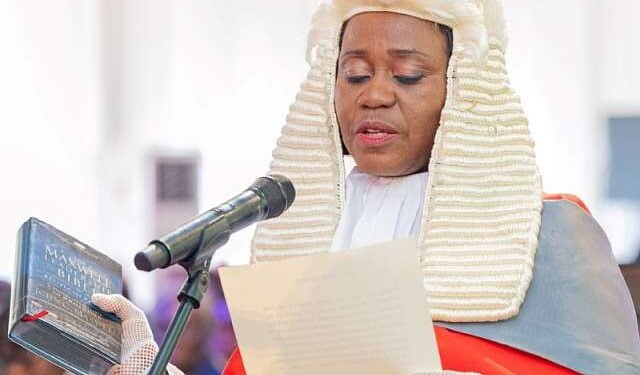Former Chief Justice Gertrude Araba Esaaba Sackey Torkornoo has initiated legal proceedings challenging her removal from office by President John Dramani Mahama. She has filed an application for judicial review at the High Court, arguing that the President’s September 1, 2025, removal warrant was unconstitutional and violated the established legal processes for removing a Justice of the Superior Court. This action not only dismissed her as Chief Justice but also stripped her of her position as a Justice of the Superior Court of Judicature, a move she contests as a breach of her constitutional rights and a threat to judicial independence. The case has significant implications for the balance of power between the executive and judicial branches of government in Ghana.
At the heart of Justice Torkornoo’s argument is Article 146 of the 1992 Constitution, which outlines the procedure for removing a Superior Court judge. This article stipulates that a judge can only be removed after an inquiry conducted by a properly constituted committee. This process ensures due process, protects judges from arbitrary dismissal, and safeguards the independence of the judiciary. Justice Torkornoo contends that President Mahama bypassed this crucial constitutional safeguard, rendering the removal warrant invalid. Her legal challenge seeks to reinstate her to her former position and affirm the supremacy of the Constitution in matters of judicial appointments and dismissals.
Through her legal representatives, Justice Torkornoo is seeking several declarations from the High Court. Foremost among these is a declaration that the President lacks the constitutional authority to remove a Justice of the Superior Court without adhering to the procedures outlined in Article 146. She further seeks a declaration affirming that the sole authority to handle petitions for the removal of judges rests with a body established under Article 146(4) of the Constitution. Finally, she requests the court to declare the President’s removal warrant “unlawful, null, void, and of no effect,” effectively nullifying the President’s action.
The case, formally styled as The Republic v. Attorney-General, Ex Parte Justice Gertrude Araba Esaaba Sackey Torkornoo, is grounded in Articles 23 and 141 of the 1992 Constitution, which address the enforcement of fundamental human rights and the appointment of Superior Court judges, respectively. The application for judicial review is brought under Order 55 of C.I. 47, the procedural rules governing such applications. This legal framework underscores the gravity of the case and its implications for the interpretation and application of constitutional provisions relating to judicial independence and the separation of powers.
The High Court’s decision in this case has the potential to be a landmark ruling on the limits of presidential power in relation to the judiciary. It will clarify the scope of Article 146 and determine whether the President’s actions were consistent with the Constitution’s prescribed process for removing judges. A ruling in favor of Justice Torkornoo would reinforce the importance of judicial independence and set a precedent restricting the executive branch’s ability to interfere with the judiciary. Conversely, a ruling against her could potentially weaken judicial independence and expand presidential authority.
The outcome of this case will have far-reaching implications for the Ghanaian judiciary and the broader constitutional framework of the country. It will shape the understanding of the balance of power between the executive and judicial branches and influence future interactions between these two arms of government. The decision will also send a strong message about the importance of adhering to constitutional procedures, particularly in matters concerning the independence of the judiciary, a cornerstone of a democratic society. The case is therefore being watched closely by legal scholars, constitutional experts, and the public at large, as it has the potential to reshape the legal landscape of Ghana.














